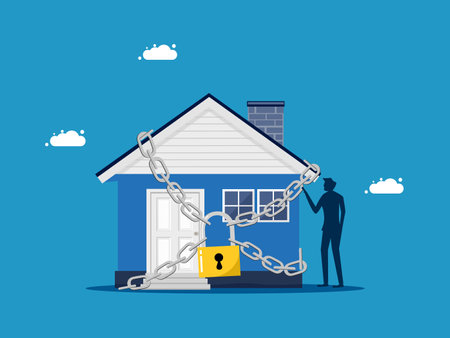Unexpected Life Changes: When Disability Strikes
Imagine waking up to a normal day, only to have your world flipped upside down in an instant. This is the reality for many Americans who have faced sudden illnesses or accidents, forcing them out of work and into the unknown. Real-life stories from across the country reveal just how unpredictable life can be—one minute you’re healthy and planning your future, the next you’re dealing with a medical crisis that halts everything. For example, Mark from Ohio was an active construction worker until a fall at work left him unable to walk; Sarah, a young mother in Texas, was diagnosed with multiple sclerosis almost overnight. Their experiences highlight why disability insurance isn’t just another optional benefit—it’s a lifeline when the unthinkable happens. Without coverage, these individuals would have struggled not only with their health but also with keeping their homes and providing for their families. These real stories remind us that no one is immune to sudden changes, and having disability insurance means you’re prepared for life’s unexpected turns.
2. Navigating the Claims Process: What You Need to Know
When it comes to filing a disability insurance claim in the U.S., real-life stories show that the process can be surprisingly complex. Many Americans have learned, sometimes the hard way, that understanding your policy and being prepared is crucial. Below, we share insights from individuals who have successfully (and unsuccessfully) maneuvered through the system, along with actionable tips and warning signs that can help you avoid unnecessary headaches or outright denials.
Real Policyholder Experiences
Consider Maria from Texas, who suffered a back injury at work. She assumed her group disability policy would kick in immediately. However, delays happened because she didn’t submit all required medical documents. In contrast, Greg from Ohio meticulously kept copies of every doctor’s note and promptly responded to insurer requests—his benefits were approved within weeks.
Common Pitfalls and Delays
| Pitfall | What Happened | Lesson Learned |
|---|---|---|
| Incomplete Documentation | Claims stalled due to missing doctor’s statements or employer forms. | Double-check all paperwork before submission. |
| Poor Communication | Policyholder missed insurer’s calls/emails leading to benefit delays. | Respond quickly and keep records of every interaction. |
| Lack of Understanding Policy Terms | Some thought “own occupation” covered any job; coverage was narrower. | Know exactly what your policy covers—and what it doesn’t. |
Red Flags: Warning Signs That Could Lead to Denials
- Vague Medical Records: If your physician’s notes don’t clearly outline your limitations, insurers may use this as grounds for denial.
- Missed Deadlines: Many policies require claims or appeal submissions within strict timeframes—miss these, and you could lose benefits entirely.
- Social Media Activity: Insurers sometimes review claimants’ public profiles for evidence inconsistent with reported disabilities.
If there’s one lesson from real Americans who have used their disability insurance, it’s this: Stay organized, communicate proactively, and know your policy inside out. These steps can make the difference between prompt payment and frustrating denials or delays.

3. Surviving Financial Shocks: How Benefits Made a Difference
Disability insurance is often seen as a safety net that you hope you’ll never need—but when life throws a curveball, it can make all the difference. Across the United States, real people have faced unexpected injuries and illnesses that put them out of work for weeks or even months. Their stories show how crucial disability benefits are in protecting not only their health but also their financial stability.
Keeping Up With Daily Expenses
Consider Sarah from Ohio, a single mom who fractured her leg in a car accident. Her short-term disability policy kicked in when she was unable to return to her retail job. The monthly benefit helped her cover groceries, utility bills, and her child’s school expenses. “Without those checks coming in, I would have had to choose between food and rent,” she says. Disability insurance meant her injury didn’t spiral into a full-blown financial crisis.
Staying Current on Mortgage Payments
For many Americans, the biggest worry during an unexpected health setback is losing their home. John, a self-employed contractor from Texas, relied on his long-term disability policy after back surgery sidelined him for several months. His benefits covered his mortgage payments just in time—preventing foreclosure. “I realized pretty quickly that savings run out faster than you think,” John recalls. Disability insurance bought him peace of mind until he could get back on his feet.
Coping With Medical Bills You Never Saw Coming
Medical emergencies don’t just bring physical pain—they often come with a stack of surprise bills. After being diagnosed with multiple sclerosis, Lisa from California faced steep out-of-pocket costs for medication and rehabilitation. Her disability benefits bridged the gap between what her health insurance paid and what she owed. “Those monthly checks kept me afloat during the toughest part of my recovery,” Lisa shares. Without her policy, mounting medical debt could have been overwhelming.
These real-life examples highlight why having disability coverage isn’t just smart—it’s essential. It provides a buffer against financial shocks so that families can focus on healing instead of worrying about money. But remember: benefits only work if your policy is active and covers your needs before you file a claim. Don’t wait for an emergency to find out if you’re protected!
4. Facing Denials and Appeals: Lessons from Rejected Claims
For many Americans, discovering that a disability insurance claim has been denied can feel like a second blow after an already difficult diagnosis or injury. Real-life stories highlight how crucial it is to understand your policy, be honest during the application process, and keep thorough records.
Personal Stories of Benefit Denials
Case Study 1: The Partial Disclosure Pitfall
John, a self-employed contractor in Texas, applied for disability insurance but omitted mentioning his past back issues. Years later, after a car accident left him unable to work, his claim was denied due to non-disclosure of pre-existing conditions. He appealed but could not provide evidence that the omission was unintentional. The lesson? Always disclose your full medical history—even minor ailments.
Case Study 2: The Fine Print Surprise
Susan from California thought her mental health coverage was comprehensive. When severe anxiety prevented her from returning to work, her claim was rejected based on a policy exclusion for certain mental health conditions. She admitted she hadn’t read the exclusions carefully at sign-up. Knowing what’s excluded can save you from disappointment and financial hardship.
The Importance of Documentation in Appeals
A strong appeal often hinges on documentation. Mark in Ohio initially had his claim denied due to “insufficient evidence” of disability. By working with his doctor to assemble detailed medical records and daily activity logs, he succeeded in overturning the denial on appeal.
Common Reasons for Disability Claim Denials
| Reason | Example | Prevention/Appeal Tip |
|---|---|---|
| Non-Disclosure | Omitting medical history during application | Be transparent; review your application with a professional if possible |
| Exclusions & Limitations | Mental health or self-inflicted injuries not covered | Understand exclusions before buying; clarify ambiguous terms with your agent |
| Poor Documentation | Lack of medical evidence supporting disability claim | Keep thorough records; ask your healthcare providers for detailed reports |
| Missed Deadlines | Late submission of claims or appeal paperwork | Set reminders for deadlines and submit all forms promptly |
Refusal-Proof Your Claim: Key Reminders
- Full Disclosure: Never hide or downplay any aspect of your medical history when applying.
- Read the Fine Print: Know what your policy covers—and what it doesn’t—before you need it.
- Document Everything: From initial symptoms to every doctor visit, keep copies and records ready.
- If Denied, Don’t Panic: Review the reason for denial, gather additional evidence, and file an appeal within the deadline.
- Seek Help: Don’t hesitate to consult an attorney or insurance specialist if you feel overwhelmed by the process.
The path from denial to approval isn’t easy, but learning from these real-life American experiences can help you avoid common pitfalls and strengthen your own case if you ever need to file—or fight—a disability insurance claim.
5. Employer vs. Private Policies: What Worked Best?
When it comes to disability insurance, many Americans face a critical choice: stick with the coverage provided by their employers or invest in an individual private policy. Real-life stories highlight how these options can play out differently when life takes an unexpected turn. For instance, Tom from Ohio relied solely on his employer’s group plan. When he developed a chronic illness, he was shocked to learn that his benefits replaced only 50% of his paycheck and lasted just two years. Worse yet, after losing his job due to the illness, his coverage ended abruptly—leaving him scrambling for alternatives.
Contrast this with Maria from Texas, who purchased an individual long-term disability policy on top of her employer’s plan. When an accident sidelined her for several months, she was able to collect from both policies—her private coverage filled in gaps left by her group plan, replacing nearly 80% of her income and extending well beyond what her employer offered. Her experience illustrates the flexibility and control private policies can provide, especially since they’re not tied to a specific job.
Americans have also found that employer-provided policies often come with strict definitions of disability and more exclusions—leading to rejected claims or less-than-expected payouts. Joe in California discovered this the hard way: his claim was denied because his policy defined disability so narrowly that his partial impairment didn’t qualify. In comparison, those with personal policies reported smoother claims processes and more personalized support from insurers.
One key lesson from these real-life cases is that relying solely on employer-based coverage can be risky—especially if you change jobs or your health situation becomes complicated. Individuals who invested in their own policies emphasized peace of mind, knowing their protection travels with them and offers broader definitions of disability.
Before choosing between employer and private disability insurance, Americans should weigh their options carefully, read all policy details closely, and consider the real-world experiences of people who have navigated the claims process. Otherwise, like some of our stories show, you might be left underinsured—or worse, denied when you need help most.
6. Planning Ahead: Protecting Your Future
If there’s one takeaway from the stories of Americans who have used their disability insurance benefits, it’s that protecting your future requires proactive planning. Many policyholders realized only after experiencing a life-changing disability that the steps they took—or failed to take—made all the difference when it mattered most.
The Value of Timely Coverage
Take Sarah’s story, for example. She purchased disability insurance shortly after starting her first full-time job, even though she was young and healthy at the time. When a sudden illness left her unable to work, her early decision meant she had coverage in place with no exclusions for pre-existing conditions. Sarah’s experience highlights how waiting until “something happens” is often too late. Insurers can deny claims if you try to get coverage after you’re already at risk or showing symptoms.
Periodic Policy Review Matters
John, a small business owner from Texas, thought he was set with his original policy bought years ago. But when an accident left him temporarily disabled, he found gaps in his coverage—his income had increased over time, but his policy hadn’t been updated. John now reviews his policy annually and advises others to do the same, especially after major life changes like marriage, starting a family, or career advancements. Not keeping your policy current can result in denied claims or insufficient benefits.
Seeking Professional Advice
Another important lesson comes from Maria in Illinois. After struggling to understand complex policy language and claim requirements on her own, she missed critical deadlines and her claim was initially denied. With the help of a licensed insurance advisor, she learned what supporting documents were needed and how to properly file an appeal—eventually securing her benefits. Maria encourages others not to go it alone; consulting with a professional before purchasing or updating your policy can make all the difference in avoiding rejection down the road.
Don’t Wait Until It’s Too Late
The real-life experiences of Americans like Sarah, John, and Maria show that planning ahead is essential—not just for getting approved for benefits, but also for making sure those benefits truly protect your financial future. Timely coverage, regular policy check-ups, and expert guidance are key strategies that can help ensure your disability insurance works when you need it most—and helps you avoid costly denial surprises.

